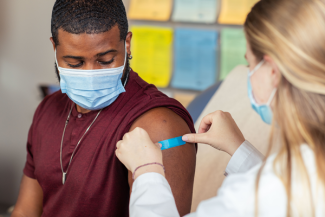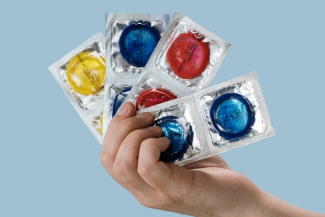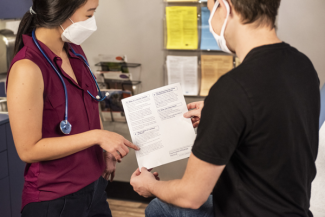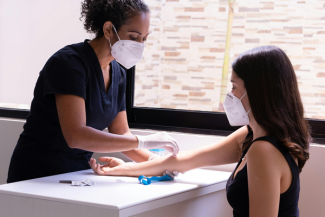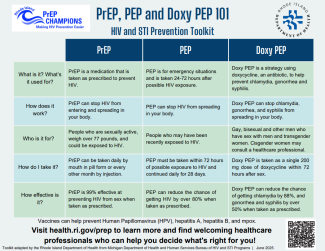Home >> Sexual Health >> Safer Sex
Knowledge is Power!
Understanding how to protect yourself from HIV and STIs is the first step you can take to keep yourself safe and prevent the spread to others. Let’s explore different preventative options.
Practice Safer Sex
Use Condoms
Rhode Island cares about your well-being. The Condoms By Mail Program offers discreet, and convenient delivery right to your mailbox.
Have a Conversation
We understand that discussing sensitive topics with your partner may feel difficult, but having open and honest communication is important for the health of your relationship.
Avoid the use of Alcohol and Drugs
Drinking alcohol or using drugs during sexual activity can increase your chances of risky sexual behavior.
Get Tested Regularly
Make testing part of your routine. Find a primary care physician or clinic near you. You can even check out the Rhode Island Department of Health's TESTING 1-2-3 Program, where you can get tested for HIV, Hepatitis C, and STIs without having to leave your home. It's a simple way to prioritize your health.
Learn About HIV PrEP, HIV PEP, and Doxy PEP
HIV PrEP is an option to prevent HIV. If you think you've been exposed to HIV, talk to your doctor about HIV Post-Exposure Prophylaxis (PEP) to prevent infection. Also, learn more about Doxycycline Post-Exposure Prophylaxis (Doxy PEP), a newly recommended STI prevention strategy that involves taking doxycycline after risky sex to prevent chlamydia, gonorrhea, or syphilis.
You can also get a free, confidential rapid HIV test from several community organizations statewide who administer these tests or you can order a free at-home HIV test kit from AIDS Project RI. The Together Take Me Home Program also offers free rapid HIV tests that can be sent to anyone 17 or older in the United States, including Puerto Rico.
You can find a list of clinics that offer HIV and STI testing. A primary care provider can also order these tests.
Go to The Corliss Clinic, which has regular walk-in hours.
- Any urgent care center if you have symptoms;
- Contact or visit Open Door Health’s Express Screening Clinic.
- Visit a Community Health Center Express Clinic (you don't have to be an established patient). These include:
- Blackstone Valley Community Health Center's Express Health Care in Central Falls and Pawtucket;
- Providence Community Health Center's Express Clinic;
- Thundermist Health Centers Convenient Care in Wakefield, West Warwick, and Woonsocket;
- Go to a CVS Minute Clinic for testing.
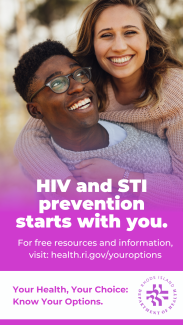
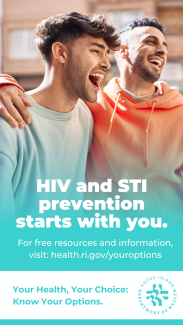
Your Guide to HIV and STI Testing: What to Expect?
1. Getting Tested:
HIV testing at a lab is done through a blood sample. A rapid HIV test can be done anywhere with an oral swab. Some STI tests are blood tests and others test your urine (pee). Reach out to your primary care physician or clinic to schedule an appointment, or consider the convenience of the TESTING 1-2-3 Program, which allows you to schedule an HIV, chlamydia, gonorrhea, syphilis, or Hepatitis C test without a trip to the doctor’s office.
Need more help finding a healthcare provider? Search here for clinics or primary care providers in RI. There is also a list of LGBTQ+-friendly doctors and health information that you can find on this page.
2. Results:
Lab results usually take a few days for analysis. If you choose to have a rapid HIV test, you can often get the results in about 30 minutes. If your test is positive, the Rhode Island Department of Health has resources available to guide your next steps, help you navigate living with HIV and getting treatment for HIV and STIs, and provide advice on notifying your partner.
It’s important for anyone who has tested positive to let their sexual partner(s) know so that it can be treated and not spread to others. Some people feel comfortable telling their partner(s) themselves. But sometimes, telling sexual partner(s) can be uncomfortable and awkward.
RIDOH health educators are here to help you. They are friendly staff who are well trained in reaching out to people and letting them know they may have been exposed to an STI and that they should get an STI check-up. This helps your sex partner(s) get treatment and stay healthy. It also helps prevent you from getting an STI again. The health educators NEVER tell anyone who you are or any information that you choose to share. You can call a health educator at 401-222-2577 and ask for partner services.
Prevention and Treatment Options
While there isn't a cure for HIV, there are treatments that enable those affected to enjoy a healthy and happy lifestyle.
If you have HIV, you can prevent passing it to others. Your partner can discuss Pre-Exposure Prophylaxis (PrEP) with their doctor. PrEP is an option to prevent HIV for those not living with it but are at risk of getting an infection. If you think you've been exposed to HIV, talk to your doctor about Post-Exposure Prophylaxis (PEP) to prevent infection.
There are many treatments for STIs and STDs. Most STDs can be cured with antibiotics. While others may not be curable, they can still be treated. If you are diagnosed, encourage your partner to get checked to prevent reinfection and avoid having sex again until you and your partner(s) have finished treatment.
Vaccines play a crucial role in preventing both diseases and infections. One important prevention tool against sexually transmitted infections is vaccination. Vaccines protect against infection with Human Papillomavirus (HPV), hepatitis A, and hepatitis B. It is also very important for sexually active people who may be at risk of mpox infection to take precautions and get vaccinated against mpox.
Talk to your doctor/healthcare professional or pharmacist if you have any questions about vaccination and options for getting vaccinated.


